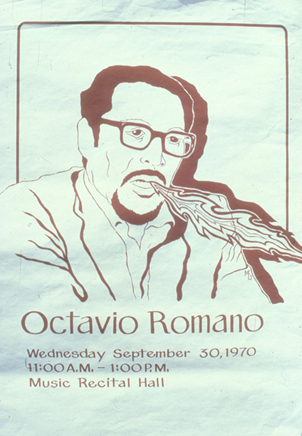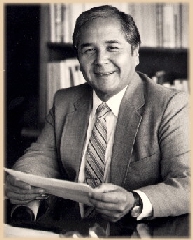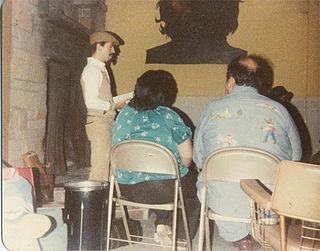Related Research Articles

Quinto Sol was the first fully independent publishing house to surface from the Chicano movement in the Sixties. Editorial Quinto Sol was founded in 1967 at UC Berkeley by Octavio I. Romano, a Professor of Behavioral Science and Public Health, in collaboration with Nick C. Vaca and Andres Ybarra. The name "Quinto Sol" is Spanish for "Fifth Sun" and it refers to the Aztec myth of creation and destruction. Since the beginning of the Chicano movement in the 1960s, this concept has become a pathway to cultural expression. The Fifth Sun has constantly been integrated into the music, art and literature of the Chicano idea.

Tomás Rivera was a Mexican American author, poet, and educator. He was born in Texas to migrant farm workers, and worked in the fields as a young boy. However, he achieved social mobility through education—earning a degree at Southwest Texas State University, and later a Doctor of Philosophy degree (PhD) at the University of Oklahoma—and came to believe strongly in the virtues of education for Mexican-Americans.
Arturo Islas, Jr. was an English professor and novelist from El Paso, Texas, whose writing focused on the experience of Chicano cultural duality.
Rafael C. Castillo was the first editor of ViAztlan: an international journal of Arts and Letters established in San Antonio, Texas in 1979. The journal was funded through the City of San Antonio and the culture-based arts organization, Centro Cultural de Aztlan. A veteran free-lance writer, Castillo authored articles germane to the Mexican American community and established philosophy-based issues and supported international causes that promoted Mexican American arts and letters. He later served as contributing editor of The Saguaro,a literary journal published at the University of Arizona, Tucson. In 1985, Castillo visited Paris, France, and met briefly with David Appelfield, editor of FRANK, an international literary journal, and became its San Antonio correspondent. In 2001, Castillo was asked to serve on the editorial board of Puentes, an international bilingual journal based at Texas A&M University–Corpus Christi.

Rigoberto González is an American writer and book critic. He is an editor and author of poetry, fiction, nonfiction, and bilingual children's books, and self-identifies in his writing as a gay Chicano. His most recent project is Abuela in Shadow, Abuela in Light, a literary memoir. His previous memoir What Drowns the Flowers in Your Mouth: A Memoir of Brotherhood was a finalist for the National Book Critics Circle Award in Autobiography. He is the 2015 recipient of the Bill Whitehead Award for Lifetime Achievement from the Publishing Triangle, and the 2020 recipient of the PEN/Voelcker Award for Poetry.

Alberto Baltazar Urista Heredia, better known by his nom de plume Alurista, is a Chicano poet and activist. His work was influential in the Chicano Movement and is important to the field of Chicano poetry.

Romeo Rolando Hinojosa-Smith was an American novelist, essayist, poet and the Ellen Clayton Garwood professor in the English Department at the University of Texas at Austin. He was noted for authoring the Klail City Death Trip series of 15 novels written over several decades.
Nash Candelaria was an American novelist. He was known for a tetralogy of novels about the Rafa family. He has been called the "historical novelist of the Hispanic people of New Mexico."
Ronald Francis Arias is an American former senior writer and correspondent for People magazine and People en Español. He is also a highly regarded author whose novel The Road to Tamazunchale has been recognized as a milestone in Mexican-American literature.

José Antonio Villarreal was an American Chicano novelist. Villarreal was born in 1924 in Los Angeles, California, to migrant Mexican farmworkers. Like Juan Manuel Rubio in Pocho, Villarreal's father fought with Pancho Villa in the Mexican Revolution. He spent four years in the Navy before attending the University of California at Berkeley in 1950.
Bilingual Review Press is an American publishing house specialising in the publication of scholarly and literary works by Hispanic and Latino American authors and researchers. It was founded in 1973 as the publisher of The Bilingual Review/La revista bilingüe, a new academic and literary journal with a focus on Spanish-English bilingualism, bilingual studies and Hispanic literature that was first issued in 1974. Under the imprint name Bilingual Press/Editorial Bilingüe the press also publishes and distributes book titles by or about Hispanic and Latin American authors, covering literary fiction, poetry as well as non-fiction titles relating to Chicano and Latin American studies. Bilingual Press publishes from 8 to 10 titles annually, with an accumulated back catalogue of more than 150 titles under the imprint in both English and Spanish as well as some bilingual editions. The publisher is also a distributor of related titles from other presses, as of 2008 numbering over a thousand releases.
Leroy V. Quintana is an American poet, and Vietnam Veteran.
Alma Luz Villanueva is an American poet, short story writer, and novelist.
Manuel Luis Martinez is an American novelist and literary critic. He was born in San Antonio, Texas, and is the author of four novels: Crossing,, Drift,, Day of the Dead, and Los Duros. His fiction deals primarily with the lives of Mexican Americans and Mexican immigrants, and explores the themes of migration, contemporary urban life, and the experience of dislocation. He is also the author of a book of literary criticism, Countering the Counterculture: Rereading Postwar American Dissent from Jack Kerouac to Tomas Rivera,.
John M. Lipski is an American linguist who is most widely known for his work on Spanish and Portuguese dialectology and variation. His research also focuses on Spanish phonology, the linguistic aspects of bilingualism and code-switching, African influences on Spanish and Portuguese, and pidgin and creole studies. He is currently the Edwin Erle Sparks Professor of Spanish Linguistics in the Department of Spanish, Italian, and Portuguese at the Pennsylvania State University. He previously served as the head of the same department from 2001 to 2005.
...y no se lo tragó la tierra is Tomás Rivera 1971 novel, most recently translated to English as ...And the Earth Did Not Devour Him. It is made up of fourteen short stories and thirteen vignettes. The novel presents stories that center around a community of South Texan Mexican American migrant farm workers during the late 1940s and early 1950s. The novel begins with the short story "A Lost Year", in which an unnamed male protagonist cannot seem to remember what occurred during the previous year. The stories and vignettes that follow are fragmented, lack chronology and lack consistency in characters. The last short story, "Under the House", ties all of these stories together by presenting them as the memories of the male protagonist, who seems to become empowered by the act of remembering. The novel won the Premio Quinto Sol prize for literature in 1970 and has since been adapted into a movie.

Francisco Jiménez is a Mexican-American writer and professor at Santa Clara University in Santa Clara, California.

Carmen Tafolla is an internationally acclaimed Chicana writer from San Antonio, Texas, and a professor emerita of bicultural bilingual studies at the University of Texas at San Antonio. Tafolla served as the poet laureate of San Antonio from 2012 to 2014, and was named the Poet Laureate of Texas for 2015–16. Tafolla has written more than thirty books, and won multiple literary awards. She is one of the most highly anthologized Chicana authors in the United States, with her work appearing in more than 300 anthologies.
Enrique Lamadrid is an American historian in the US state of New Mexico, known for his studies of Chicano, Mexican American, and Hispano culture. He is Professor Emeritus for the Department of Spanish and Portuguese at University of New Mexico. He has worked for the Smithsonian Institution, Museum of New Mexico, and the National Hispanic Cultural Center. He has written books in both English and Spanish.
New Mexican literature includes the modern American literature of the U.S state of New Mexico, along with its former Santa Fe de Nuevo México and New Mexico territories. It is influential in English language and Spanish language literatures, and most of its history has been influenced by Native American literature, Spanish literature, Mexican literature, and English literature.
References
- ↑ Hispanic Link Weekly Report
- ↑ Vernon E. Lattin
- ↑ Welcome to Brooklyn College
- 1 2 3 "A Crisis in American Education"; Vernon E. Lattin Commencement Address June 2, 1998.
- ↑ "1966–1967 University Course Catalog: The Wright State Campus of Miami University and the Ohio State University"
- 1 2 "4 Named to Executive Posts at CUNY"
- ↑ "The Chicano Student and Anglo-American Fiction"
- ↑ "City College Chief Resigns Amid Wave of Staff Changes"
- ↑ "Vernon E. Lattin, President, Brooklyn College (1992–2000)"
- ↑ Richard Grayson (2012). Spring in Gainesville
- ↑ Vicki L. Ruiz, Virginia Sánchez Korrol (2006). Latinas in the United States, set: A Historical Encyclopedia, Indiana University Press.
- ↑ Vernon E. Lattin, Rolando Hinojosa (1988) Tomas Rivera, 1935–1984: The Man and His Work, Bilingual Review/Press, ISBN 0916950891
- ↑ Vernon E. Lattin (1986) Contemporary Chicano fiction: a critical survey; Studies in the language and literature of United States Hispanos, Bilingual Press/Editorial Bilingüe, ISBN 0916950573.